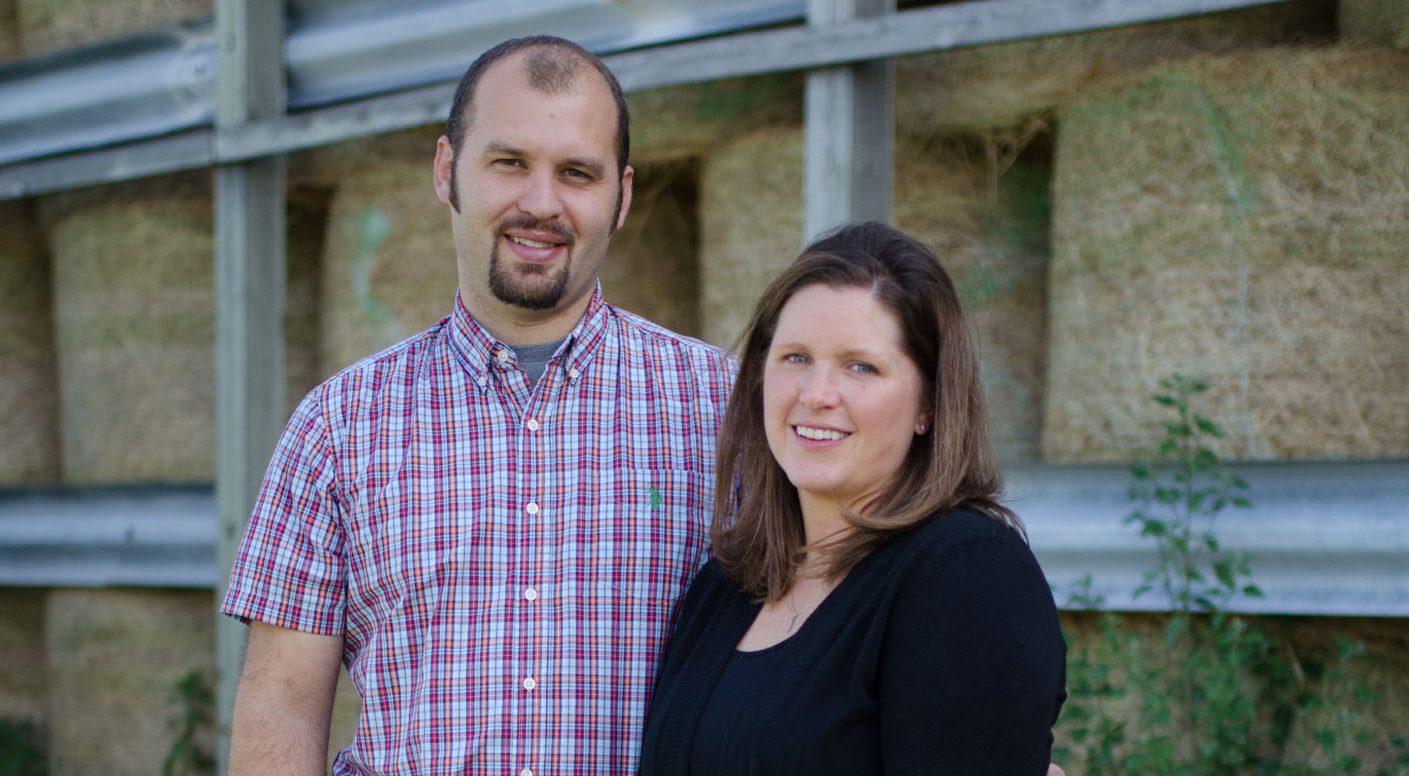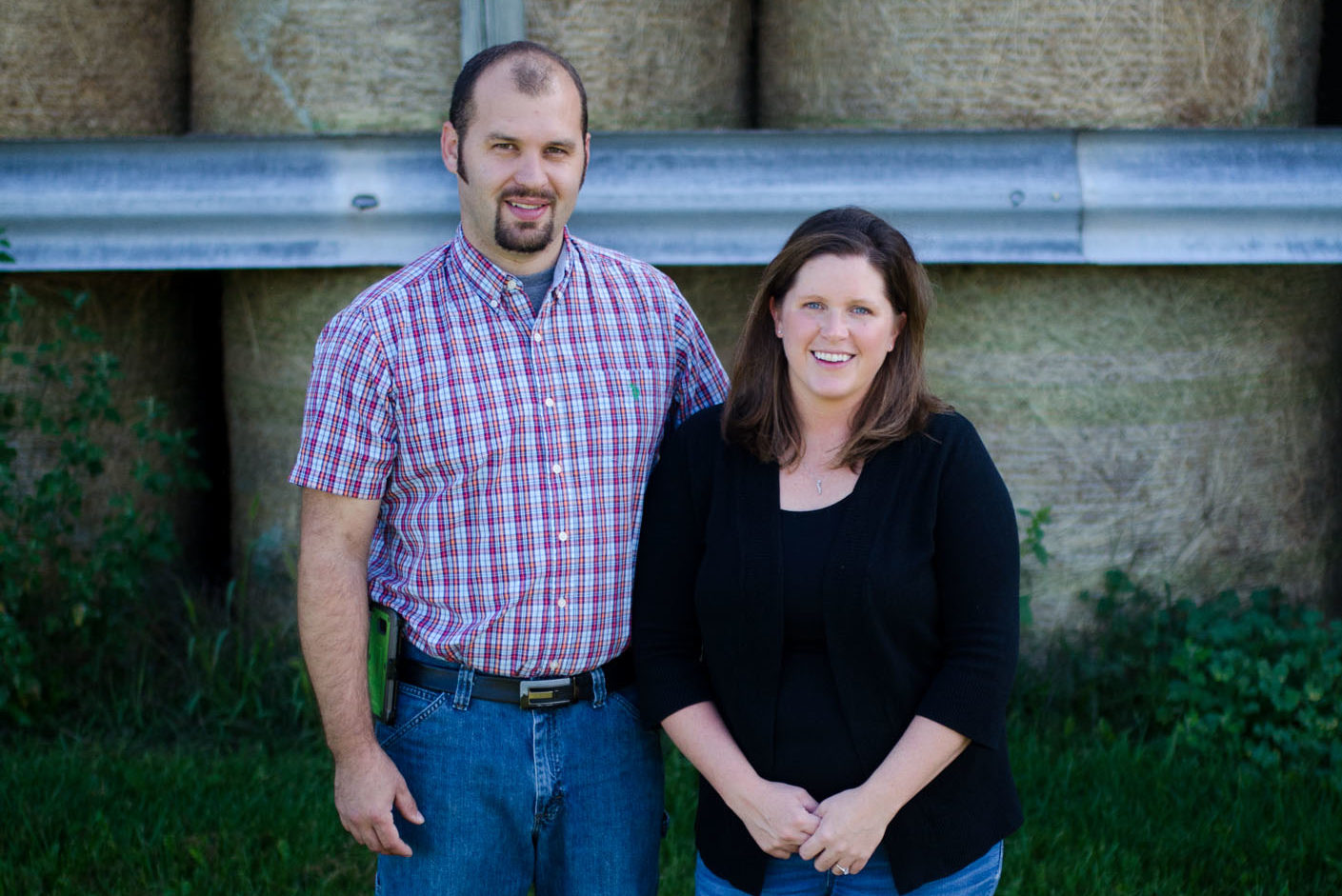Nate and Jenny Elzinga are committed. That may seem like an obvious statement to describe a married couple, but this pair is committed not just to each other but to working together to power their 240-cow dairy farm forward with technology. Through their partnership, the husband-and-wife team is best caring for their farm, which involves day-in and day-out hard work, and tracking data to make the best decisions for the cows on Daybreak Dairy.
This year, the Elzingas are taking it a step forward—and a step or two off their farm—to lend their skills to the dairy industry. Nate and Jenny were named the 2017 Outstanding Young Dairy Cooperators, becoming the 57th participant of a select group of MMPA members designated to represent their co-op on a nationwide scale.
But before co-op recognition, before leading a progressive dairy and before rearing five children, 16-year-olds Nate and Jenny first crossed paths at the Berlin fair. She was showing a beef steer that day and he was roaming the fair grounds. “I got my toe crushed by my steer and so I was sitting there, trying not to cry and he walked by,” Jenny recalls. An awkward hello led to the day spent together at the fair with their friends—who did more talking than they did—and an eventual date spent fishing in the dark.
While Nate grew up on this farm, his father had purchased it in 1976, Jenny wasn’t as familiar with the dairy life. Her grandparents had owned a dairy farm, but long sold the cows, and when a few years later the young couple got engaged, Jenny’s grandmother asked the soon-to-be farm wife: “Are you sure you know what you’re doing?” One look at Jenny and it’s clear—despite that tongue-in-cheek question—she is well suited for the role.
Today, the couple work in tandem with each other and Nate’s family on their farm. A graduate of the Michigan State University dairy management program, Nate manages employees, nutrition, breeding and overall animal care. Jenny oversees raising the farm’s calves in a calf barn that features an automatic calf feeding machine. Yet Jenny admits their roles can be interchangeable with one stepping in for the other’s responsibilities when needed.
“We work well together,” Jenny, who completed a veterinary technology program at Baker College, describes. “We just click with each other, so it seems to work well. I don’t mind getting my hands dirty.”
“We support each other very well. It’s easy for one of us to have a bad day, so we need to support each other and go back and forth,” Nate adds.
When discussing the operations of his farm, Nate frequently shifts to uncover data on his computer, looking up information from both a high level and close look at every aspect of the farm and the progress of each cow. One monitor has a live feed of video from various locations on the farm, yet the other two show a more encompassing view of the farm through an integrated software system.
The system links various area of the operation and displays information on his computer. Data is collected in the dairy’s double eight herringbone parlor during milkings and related to other metrics from around the farm, such as the activity-monitoring pedometers fitted to each cow. The Elzingas use these technologies to best manage herd health, nutrition, breeding and milk production.
“Everything is connected on a dairy farm. I like the cows and I like the technology. I’m able to match those two things up,” Nate explains.
Technology – love or hate it, as some producers do – can advance a dairy’s production, efficiency and management. While adoption of new software programs and monitoring systems can be costly to producers, Nate sees the advantage on his farm.
“Technology helps you manage to a higher level. If you use as intended, it helps you do more with fewer people. I’m still busier than ever, just getting more work done,” he says.
As an example of this modernization, Jenny points to a change in their practices for managing and detecting ketosis, a metabolic disease that sometimes affects early lactation cows. In the parlor, daily components are tested with each milking and if the butterfat and protein ratio is above a certain threshold, the system generates a list of cows with a high possibility of having ketosis. This eliminates the need to take a urine sample on each cow and thereby saves time.
Ketosis monitoring is just one useful maneuver the Elzingas trust. When it comes to monitoring production and performance, they have the data to back everything up. The software system tracks milk out times and can identify any disruptions in regular performance as soon as it happens. “If there is a deviation, it sticks out like a sore thumb,” Nate describes.
Nate manages the farm’s five full time and three part time employees by maintaining positive relationships with his staff. To improve employee morale and decrease turnover, they increased wages, added paid vacation and a housing allowance. The farm clearly outlines policies and expectations for employees in a handbook, while both staff and family have attended MMPA training programs for calf care and milking procedure.

Overall, the Elzingas goal is to, “bring our modern dairy to the next level through animal comfort, nutrition, genetics and by following the best cropping and manure practices.” Through their hard work, Daybreak Dairy has been recognized for quality heifer care by Hoard’s Dairyman, while earning production awards from DHI and the Holstein Association, and quality awards from MMPA. They have built a solid reputation in the community. “We’ve made a name for our cows,” Jenny says.
Growth and continuous improvement is a goal too. “I want to make things better for our employees and for us, the only way to do that and not reduce what we’re doing here is to scale up,” Nate explains. “I want to move genetics forward and move production forward.”
Beyond the farm, the Elzingas are involved with their local community and agriculture industry. In addition to involvement at their church, they host farm tours, are active on social media and Jenny is an MMPA Dairy Communicator. In 2011, Daybreak Dairy hosted a Breakfast on the Farm. Nate lends his experience to the Muskegon Technology Center as a member of their advisory committee and by encouraging careers in dairy.
“Being involved and making connections provides opportunities, even if you don’t always know what those are at the time,” Nate acknowledges. “Eventually it turns into something.”
The Elzinga’s role as OYDC may be a new endeavor for the couple, but it’s one they’re nevertheless ready to take on—together.
–Allison Stuby Miller
This article originally appeared in the October issue of the Michigan Milk Messenger.
Selection for the 2018 Outstanding Young Dairy Cooperator program begins this winter during local meetings. If you are interested in participating in the program, contact your local.

